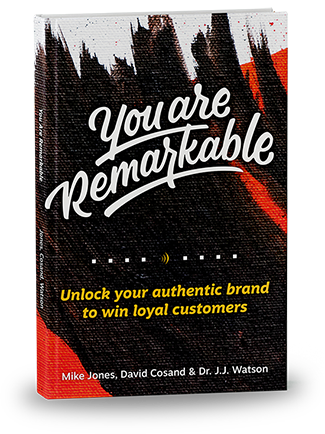Podcast: Play in new window | Download
Subscribe: RSS
A reputation for lying is the only thing worse than a reputation for bending the truth.
Either way, getting caught doing it obliterates everything—trust, careers, and not the least of all, relationships. From the still-smoldering fallout of the Ashley Madison email hack to notorious, tabloid-worthy cover-ups, lying creates a situation no person, business, or company ever wants to be in.
And as we’ll see in this blog, the same principle applies to branding.
Last month, we looked at why brands can’t be arbitrarily invented. From the carelessness to pretentiousness, we touched on the importance of building a meaningful brand identity.
Aside from working gradually, and thoroughly, to understand every aspect of what your organization does, there’s no way to capture and present a brand identity that tells the full truth. As we’ll discuss in this blog, being fictitious, or outright deceitful, is the fastest way to destroy a brand or company that people can trust.
In dating or branding, misleading people is just plain creepy
Imagine for a moment that you’ve been trying for a long time to find that special person, so you decide to download a dating app. You’ve heard some success stories, so you’re giving up on the real world and heading online.
So you open up the app and search some profiles, swipe left a few times, and find some others interesting. Then you find one profile and you say, “Oh wow! That person is really cute. I like that photo.” You read the bio, and you think: “Yeah, definitely, it seems like I’ll click with them. What they’re saying resonates with me. I like The Lord of the Rings too?! I’m excited to get to know them.” You send them a message, and they send one back. Before you know it you’re on your way to your first date.
And on that first date, you discover that . . . they look nothing like their profile photo. You’ve been catfished!
The bio you read? Most of it was fake. Some of it was exaggerated and some was made up to sound good.
That sense of connection? The feeling you could relate with them? A complete illusion. You just happened to be in the “target demographic” this person was hunting for a date with.
You find yourself wishing you could swipe in real life.
Even if they turned out to be pretty cool in their own right and had an interesting life story, or even if they had a lot in common with you, it wouldn’t matter to you anymore because they lied to you. Any potential they had for being trustworthy would be gone.
The whole charade is just plain creepy.
Lying About Your Brand is Just as Bad
That is how your customers feel when you try to form a fake relationship with them.
You can’t just arbitrarily decide you want to connect with a certain demographic and then change your branding to try to fit what you think they want. It might get them in the door, but they’ll leave quicker than they came in. You can’t present your business as something it isn’t.
Real people are naturally adept at spotting fake people. We can recognize the stock photos on a website and artificial smiles from employees who hate their jobs. We feel cheated when the fun-loving tone of your Twitter feed doesn’t match the robotic operator we get when we call expecting to talk with a live person.
The way you express your brand publicly, whether through a website, a newsletter or social media, is an invitation to extend a relationship. But a business can’t simply invent the people who are part of its team or the kind of relationships it wants with the customers it serves. It has to carefully and painstakingly hire and train that team to align with its values, and it has to grow relationships with its customers through authentic and honest communication.
“Dating” your customers in the real world takes a lot more work than creating a profile page with some beautiful photos and inspiring text, but those genuine relationships will pay off in loyalty and commitment.
Truth-telling fiction versus fictitiousness
Good fictions must ring true.
The events in the story did not literally happen—that’s why it is fiction. But the underlying story must be something that really happens, all of the time, to many people. The events in the story might be a fantasy but the story itself, to be any good, has to tell us about reality.
There is a difference between being fictional and being fictitious. A fictional story is one that everyone knows to be false, and yet tries, through the use of analogy and other literary devices, to present us with the truth in a new way. A fictitious story, on the other hand, is one that purports to be true, but which in reality is entirely fabricated.
Every brand tells a story because every brand is a story. A brand’s essence—its purpose, values, relationships and identity—are best articulated through a narrative rather than a list of bullet points. That narrative is almost never a literal timeline of the company, but rather through storytelling, like the plot of a good book or movie.
That story is expressed through everything else—its choice of photography, the tone of its content, the way it interacts on social media, the signage and even the furniture inside its physical location. People who observe these outward expressions are subconsciously reconstructing the brand’s story in their mind, and using that to figure out how they want to relate to the brand.
Remarkable brands know it pays to tell the truth
A brand’s story about itself has to ring true with reality.
If a customer goes into a restaurant, the story they put together from reading reviews and looking at photos of the restaurant needs to match up with the story they experience when they walk inside. If the reviews are faked, or bribed, and the photos give the impression of a very different atmosphere than they encounter, then the story doesn’t ring true.
It’s fictitious. A hoax.
The cumulative effect of arbitrarily inventing your purpose, brand expression, and relationships is a fictitious story. A lie. The easiest way to prove a story is fictitious is to show that it is inconsistent, like the liar who must inevitably contradict themselves. Once people start asking questions and poking holes in your fake brand, it will fall apart.
The benefit of telling a truthful brand story is that it takes a lot less effort to maintain over time. While keeping your behavior aligned with your values takes effort, there’s no extra work involved in being consistent. In the long run, telling the truth is easier than maintaining a lie.
Even con men know that lies don’t hold up for long under scrutiny.
In the words of playwright David Mamet’s cutthroat salesmen: “Always tell the truth.. It’s the easiest thing to remember.”
Whether you’re in the B2B sector, manufacturing, or an industry that requires an extensive online and social media presence, nothing will beat the honest work of communication, building relationships, and moving toward a comprehensive understanding of what’s remarkable about you.
Need Help?
Are you tired of trying to ‘date’ customers with a fictitious brand?
Are you struggling to get a handle on what you have to offer and how you should present yourself to everyone else?
With videos, self-assessments, and even one-on-one workshops, we’ve got resources aimed at helping B2B companies build authentic… and truthful... brand identities.
Whether it’s helping revamp your social and website, or starting from scratch to help with brand identity and brand strategy, the Resound team is here to help.
We know that you’re remarkable.



